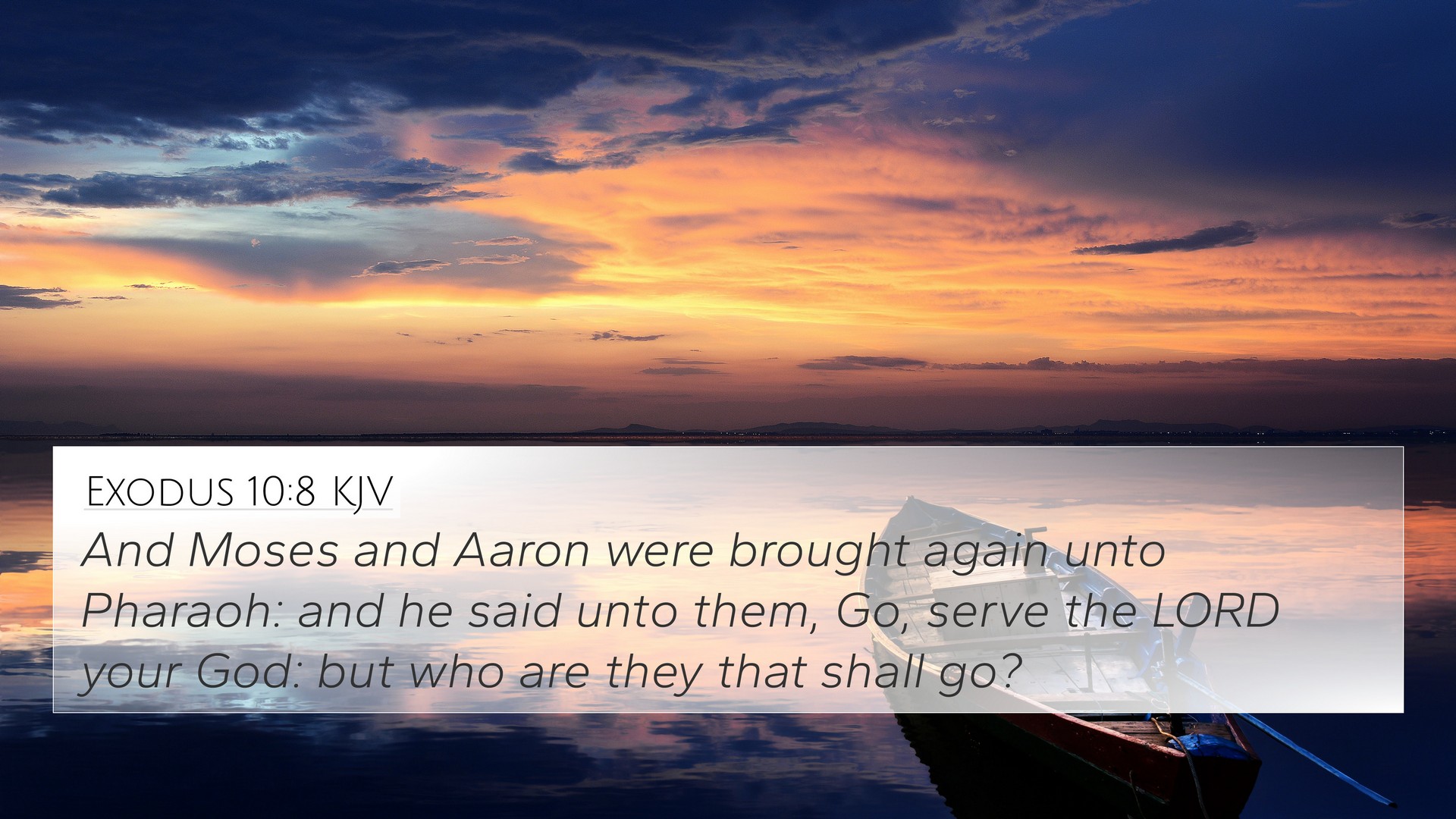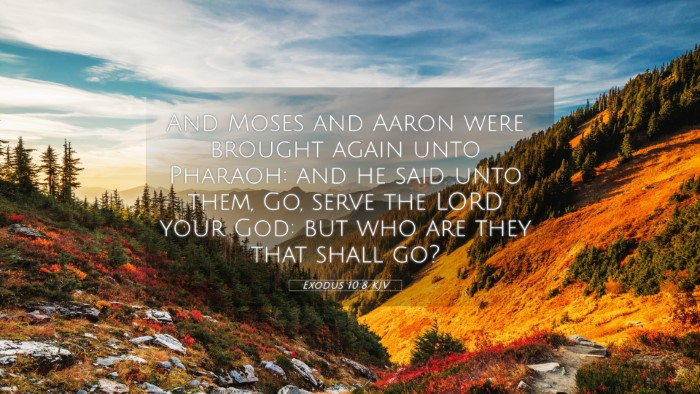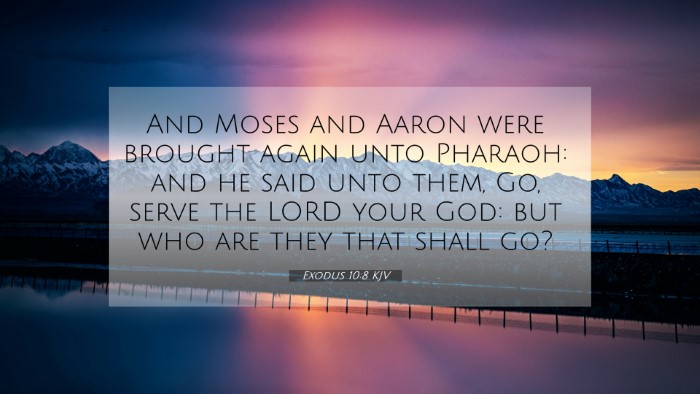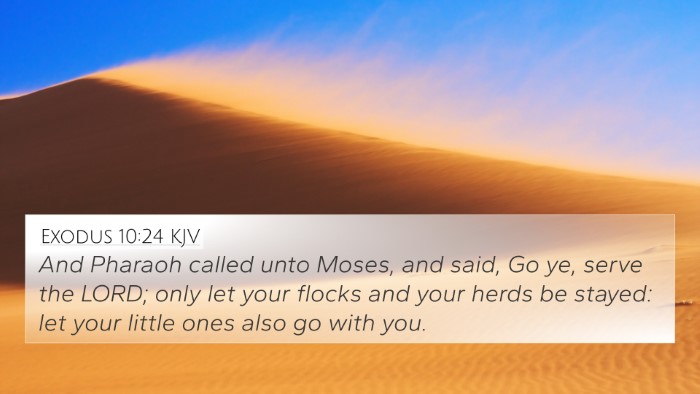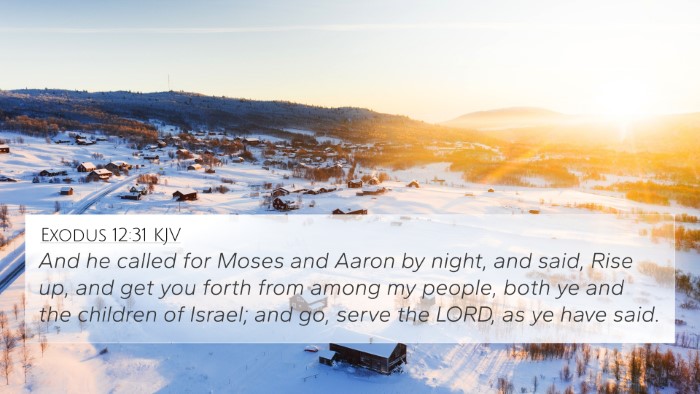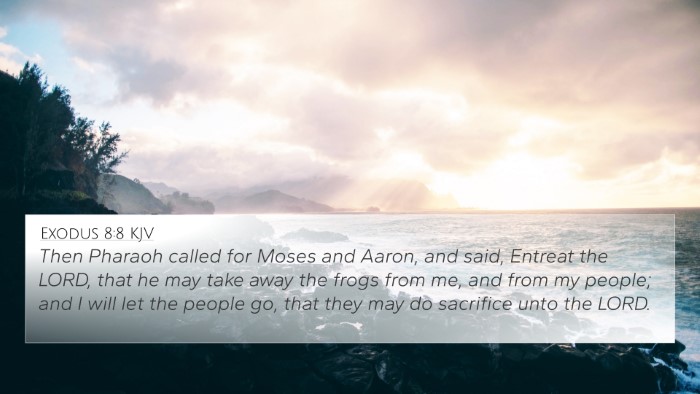Understanding Exodus 10:8
Exodus 10:8 states, "So Moses and Aaron were brought again unto Pharaoh: and he said unto them, Go, serve the LORD your God: but who are they that shall go?"
Summary of the Verse
This verse describes a pivotal moment in the narrative of the Exodus, where Moses and Aaron confront Pharaoh regarding the liberation of the Israelites. Pharaoh's inquiry reveals his unyielding nature and serves as a backdrop to the ongoing struggle between divine command and earthly authority.
Commentary Insights
-
Matthew Henry Commentary:
Matthew Henry emphasizes the idea of Pharaoh’s continued resistance to God's commands. He notes that Pharaoh's question, "who are they that shall go?" indicates his skepticism about the necessity of allowing any Israelites to leave. It reflects his arrogance and reliance on his power, reminding believers of the importance of humbly submitting to God’s will.
-
Albert Barnes' Notes on the Bible:
Barnes interprets this moment as not just a challenge to Moses and Aaron but a broader symbol of spiritual resistance. He points out that Pharaoh recognizes a potential threat to his authority from an undefined group of people. This highlights the conflict between earthly rulers and God's plans, serving as a reminder of the futility of opposing divine purposes.
-
Adam Clarke's Commentary:
Adam Clarke delves into the implications of Pharaoh's words, assessing how this moment continues to escalate the confrontation between him and Moses. Clarke suggests that Pharaoh’s question underscores a division between the Israelites and the Egyptians, illustrating the importance of recognizing God’s call to freedom and the subsequent refusal of that call by those in power.
Thematic Connections
Exodus 10:8 connects with several other biblical themes, notably the struggle for liberation and the refusal to submit to God’s will. This verse explores the dynamics between divine mandates and human authority, reflecting on broader theological themes throughout the Bible.
Bible Verse Cross-References
- Exodus 3:10 - God's command to Moses to lead the Israelites out of Egypt.
- Exodus 5:1 - The initial demand made to Pharaoh to release the Israelites.
- Exodus 12:31 - Pharaoh ultimately permits the Israelites to leave.
- Romans 9:17 - The purpose of Pharaoh's hardening in relation to God's power.
- Hebrews 11:24-26 - The faith of Moses in confronting Pharaoh.
- Acts 7:36 - Stephen’s recounting of Moses leading the people out of Egypt.
- Matthew 2:15 - Reference to Egypt as a place of refuge for the Holy Family.
- Matthew 28:19-20 - Jesus’ command to go and make disciples parallels the call to freedom.
- 2 Corinthians 6:17 - The call to come out from among them, similar to the Israelites' liberation.
- Revelation 12:10 - The ultimate victory of God's people over the forces of evil.
Connecting Themes in Scripture
The thematic connections in Exodus 10:8 resonate through various scriptures, emphasizing the liberation theme that resonates throughout the Bible. The response to authoritarian rule and the biblical call to freedom reflects a consistent narrative applicable to many believers today.
How to Use Bible Cross-References
Engaging with Bible cross-references involves studying connections between verses, identifying themes, and understanding the interplay of both the Old and New Testaments. Tools for Bible cross-referencing include:
- Bible Concordances: Aids in finding words and their references throughout Scripture.
- Cross-Reference Guides: Provide structured pathways to related verses.
- Bible Reference Resources: Explore interconnections and thematic links.
Conclusion
Exodus 10:8 serves as a crucial reminder of humanity's constant struggle against divine authority and the consequences of such resistance. By understanding this verse in light of its scriptural cross-references, believers can appreciate the cohesive narrative woven throughout the Bible, deepening their spiritual insight and encouraging them to seek the paths of freedom aligned with God's will.
